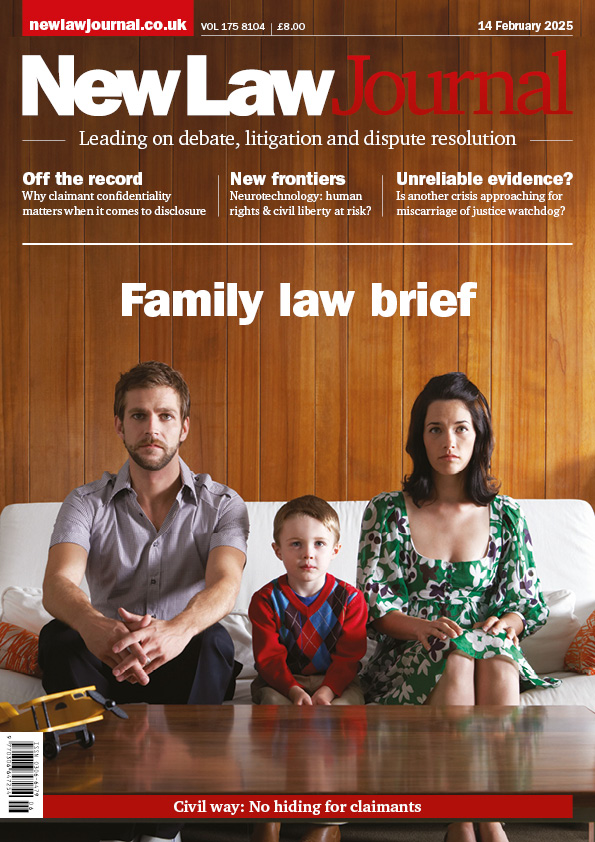THIS ISSUE

Is our criminal appeals system fit for purpose? Jon Robins, NLJ columnist, writes that he recently attended an ‘astonishing press conference’ on the Lucy Letby case, in which the international panel of medical experts, working pro bono, ‘did not equivocate.
Welcome to the brave new world of neuropolitics! In this week’s NLJ, Harry Lambert, Outer Temple Chambers, continues his fascinating series on the fast-emerging area of neurorights with a look at free will, our sense of self, individual agency and freedom of thought.
In a small road accident claim, do we really need to know the full details of the claimant’s childhood medical history? ‘In modest personal injury claims, routine, unnecessary and inappropriate disclosure of the entirety of claimants’ medical records is not acceptable,’ Charles Davey, a barrister with The Barrister Group, writes in this week’s NLJ.
Three cases concerning contributory action and re-engagement, injury to feelings and blacklisted airline pilots come under scrutiny in this week’s NLJ. Ian Smith, barrister, emeritus professor of employment law at the Norwich Law School, UEA, and author of NLJ’s monthly employment law brief, comments that cases on re-engagement, the first in the trio, are ‘relatively rare’. This case ‘shows how carefully an employment tribunal must construe exactly what is expected of it when considering re-engagement’.
From moths in the attic to the right to manage, 2024 provided a plethora of landmark real estate litigation cases. In this week’s NLJ, Ben Hatton, director of property litigation, Jordan Gulwell, lawyer, and Natasha Vij, trainee solicitor, at Clifford Chance, survey the stand-out cases and set out some lessons to learn from each.
Former district judge Stephen Gold highlights some unplanned side-effects of proposed legislation to include the names of claimants in the Register of Judgments, Orders and Fines, in this week’s NLJ.
What happened in family law in the last quarter of 2024? A lot, as demonstrated by Ellie Hampson-Jones, senior associate, and Carla Ditz, knowledge development lawyer at Stewarts, authors of NLJ’s family law brief.
Is our criminal appeals system any more prepared to recognise an injustice than it was back in the ‘bad old days’? Jon Robins reports
Ellie Hampson-Jones & Carla Ditz analyse the outcomes of the first Family Court Annual Report, as well as other crucial developments in the field
Ben Hatton, Jordan Gulwell & Natasha Vij explore 2024’s stand-out cases in real estate litigation: what can we learn for the coming year?
MOVERS & SHAKERS

Keystone Law—Milena Szuniewicz-Wenzel & Ian Hopkinson
International arbitration team strengthened by double partner hire

Coodes Solicitors—Pam Johns, Rachel Pearce & Bradley Kaine
Firm celebrates trio holding senior regional law society and junior lawyers division roles

Michelman Robinson—Sukhi Kaler
Partner joins commercial and business litigation team in London
NEWS
The Legal Action Group (LAG)—the UK charity dedicated to advancing access to justice—has unveiled its calendar of training courses, seminars and conferences designed to support lawyers, advisers and other legal professionals in tackling key areas of public interest law
As the drip-feed of Epstein disclosures fuels ‘collateral damage’, the rush to cry misconduct in public office may be premature. Writing in NLJ this week, David Locke of Hill Dickinson warns that the offence is no catch-all for political embarrassment. It demands a ‘grave departure’ from proper standards, an ‘abuse of the public’s trust’ and conduct ‘sufficiently serious to warrant criminal punishment’
Employment law is shifting at the margins. In his latest Employment Law Brief for NLJ this week, Ian Smith of Norwich Law School examines a Court of Appeal ruling confirming that volunteers are not a special legal species and may qualify as ‘workers’
Criminal juries may be convicting—or acquitting—on a misunderstanding. Writing in NLJ this week Paul McKeown, Adrian Keane and Sally Stares of The City Law School and LSE report troubling survey findings on the meaning of ‘sure’
The Serious Fraud Office (SFO) has narrowly preserved a key weapon in its anti-corruption arsenal. In this week's NLJ, Jonathan Fisher KC of Red Lion Chambers examines Guralp Systems Ltd v SFO, in which the High Court ruled that a deferred prosecution agreement (DPA) remained in force despite the company’s failure to disgorge £2m by the stated deadline







